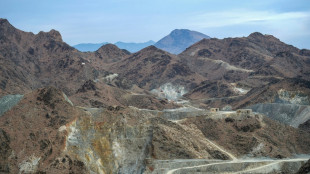
-
 Cash-keen Taliban betting on Afghanistan's mines
Cash-keen Taliban betting on Afghanistan's mines
-
Seeking light in dark times four years after Myanmar coup

-
 Autos, electronics: What will Trump's tariffs impact?
Autos, electronics: What will Trump's tariffs impact?
-
Three things we learned in the Six Nations

-
 Russia and Ukraine trade blame for attack on Kursk school
Russia and Ukraine trade blame for attack on Kursk school
-
For world's poorest, fears for long-term setbacks after Trump aid cut

-
 Chappell Roan: the splashy pop supernova
Chappell Roan: the splashy pop supernova
-
Has Trump changed tack on Venezuela?

-
 Trump unveils sweeping US tariffs on Canada, Mexico, China
Trump unveils sweeping US tariffs on Canada, Mexico, China
-
McIlroy and Lowry charge at Pebble Beach but Straka leads

-
 Russian attacks on Ukraine kill 15
Russian attacks on Ukraine kill 15
-
Japan beat Britain in Davis Cup as Danish rally stops Serbia

-
 US unveils sweeping tariffs on Canada, Mexico, China
US unveils sweeping tariffs on Canada, Mexico, China
-
Kim holds on to lead at LPGA season-opener

-
 Thousands of Argentines march in defense of diversity
Thousands of Argentines march in defense of diversity
-
Real Madrid fall at Espanyol as Atletico cut Liga gap

-
 Ex-Charlie Hebdo artist wins top prize at comics festival
Ex-Charlie Hebdo artist wins top prize at comics festival
-
At least 56 killed as fighting grips Sudan's capital

-
 Russian attacks on Ukraine kill 14
Russian attacks on Ukraine kill 14
-
Netanyahu to begin talks on 2nd phase of Gaza truce

-
 Doris proud as faltering champions Ireland beat England in Six Nations opener
Doris proud as faltering champions Ireland beat England in Six Nations opener
-
Swiss Britschgi wins European figure skating gold

-
 Trump tariff deadline looms, Canada told levies coming Tuesday
Trump tariff deadline looms, Canada told levies coming Tuesday
-
Russian attacks on Ukraine kill 13

-
 US Democrats anoint new leader to take on Trump for 'working people'
US Democrats anoint new leader to take on Trump for 'working people'
-
Atletico beat Mallorca to stay on Real Madrid's tail

-
 Ireland start Six Nations title defence with gritty England win
Ireland start Six Nations title defence with gritty England win
-
Ireland start Six Nations title defence with England win

-
 Serbia protesters mark three months since deadly roof collapse
Serbia protesters mark three months since deadly roof collapse
-
Japan beat Britain in Davis Cup as Serbia lose to Denmark

-
 Egypt's Sisi tells Trump world 'counting on' him for Middle East peace
Egypt's Sisi tells Trump world 'counting on' him for Middle East peace
-
Pakistan separatist militants kill 18 paramilitaries in ambush

-
 In-form Dembele hits hat-trick again as PSG thump Brest
In-form Dembele hits hat-trick again as PSG thump Brest
-
At least 56 killed as fighting grips greater Khartoum

-
 Toll rises to 7 dead, 19 hurt in Philadelphia plane crash
Toll rises to 7 dead, 19 hurt in Philadelphia plane crash
-
Scots held nerve to beat Italy, says satisfied Townsend

-
 Salah takes Liverpool nine clear, Forest hit Brighton for seven
Salah takes Liverpool nine clear, Forest hit Brighton for seven
-
Serbia protesters mark three-months since roof collapse with mass rally

-
 Bayern survive late Kiel fightback to go nine points clear
Bayern survive late Kiel fightback to go nine points clear
-
Salah's controversial penalty fires Liverpool nine points clear

-
 Russia fires deadly barrage on Ukraine as it presses on key city
Russia fires deadly barrage on Ukraine as it presses on key city
-
Jones hat-trick secures Scots opening Six Nations win over Italy

-
 Trump tariff deadline looms over Canada, Mexico, China trade
Trump tariff deadline looms over Canada, Mexico, China trade
-
Hamas and Israel complete fourth Gaza ceasefire swap

-
 Ex-England coach Lancaster leaves Racing 92
Ex-England coach Lancaster leaves Racing 92
-
Wood hits hat-trick as flying Forest thrash Brighton 7-0

-
 Horst Koehler, German ex-president and IMF chief, dead at 81
Horst Koehler, German ex-president and IMF chief, dead at 81
-
DR Congo conflict risks broader regional war, Burundi warns

-
 Britain's Tom Pidcock wins Al-Ula Tour
Britain's Tom Pidcock wins Al-Ula Tour
-
Man Utd's Rashford close to Aston Villa loan: reports

| CMSC | -0.89% | 23.47 | $ | |
| RBGPF | 100% | 67.27 | $ | |
| BTI | -0.1% | 39.64 | $ | |
| GSK | -0.26% | 35.27 | $ | |
| RYCEF | -0.81% | 7.43 | $ | |
| AZN | -0.68% | 70.76 | $ | |
| RIO | -0.83% | 60.41 | $ | |
| NGG | -0.55% | 61.4 | $ | |
| RELX | -0.92% | 49.89 | $ | |
| CMSD | -1.59% | 23.84 | $ | |
| SCS | -1.39% | 11.48 | $ | |
| BCC | -1.98% | 126.16 | $ | |
| VOD | -0.82% | 8.54 | $ | |
| BCE | -0.46% | 23.79 | $ | |
| BP | -1.77% | 31.06 | $ | |
| JRI | -0.32% | 12.53 | $ |

Has Trump changed tack on Venezuela?
Within his first two weeks in office, US President Donald Trump sent an emissary to arch-rival Venezuela, an apparent about-turn from the hard-line approach he adopted toward Caracas during his first term.
Washington has not recognized Nicolas Maduro's reelection in a vote he is widely accused of stealing, and has instead continued to consider opposition leader Edmundo Gonzalez Urrutia as Venezuela's president-elect.
Yet Trump envoy Richard Grenell met Maduro himself in Caracas on Friday, securing the release of six US prisoners held in the Caribbean country in talks Caracas said were held in "mutual respect."
On Saturday, Trump announced Venezuela had agreed to accept illegal migrants deported from the United States, including gang members -- and had even agreed to provide the transport.
"It is clear that the government of Donald Trump had two main interests in the relationship with Maduro as a starting point: the first is the migration issue and the second the situation of US citizens arbitrarily detained in Venezuela," international relations expert Mariano de Alba told AFP.
The meeting apparently "opens the door to an improvement in relations," he added, though perhaps not "in the short term."
- 'New beginning' in US-Venezuela relations? -
Venezuela has the world's biggest known oil reserves, but production is stunted, the country is heavily sanctioned and GDP has dropped 80 percent in a decade on Maduro's watch -- prompting nearly eight million of the country's 30 million citizens to flee.
Caracas broke off diplomatic relations with Washington in January 2019 after Trump recognized then-opposition leader Juan Guaido as "interim president" after elections also rejected as neither free nor fair.
The strategy of recognizing Guaido collapsed and Maduro merely tightened his hold on power.
The Joe Biden administration later relaxed sanctions on oil as part of a deal for American prisoners and a promise to hold free elections.
Venezuela freed 10 Americans in a swap, but Biden reimposed sanctions after Maduro did not follow through on democratic reforms.
Phil Gunson, a Venezuela expert at the International Crisis Group think tank, said he was not surprised Washington and Caracas made contact, but noted "the speed with which an apparent agreement has been reached."
"It was illusory to think that Trump would come with the same maximum pressure policy" that had previously failed to influence Maduro, he said.
It was not clear what, if anything, Venezuela had gained from the talks with Grenell, after which Maduro called for a "new beginning" in bilateral relations.
But "it is safe to assume that... there was an express request from the Maduro government not to increase pressure with sanctions," said de Alba.
- 'Important symbolism' -
A Venezuelan government statement said "the negative impact of economic sanctions" was among the issues discussed with Grenell.
But for now, it seems the status quo remains, said Gunson.
Trump has so far not introduced any changes to a Biden-era concession allowing oil companies such as Chevron to continue operating in Venezuela despite sanctions against the regime.
Maduro "would like to have the sanctions lifted, that's obvious, but if he has to live with what he's got -- the concessions that Biden made -- he can live with it," the analyst added.
A Trump administration official meanwhile recently said that: "we don't need Venezuelan oil."
De Alba said Grenell's visit, which Maduro has celebrated as a triumph, carried "important symbolism" and could be interpreted as a blow for the opposition, which has its strongest ally in the United States.
"We say to President Donald Trump: we have taken a first step. Hopefully it can be sustained, we want to sustain it," Maduro said Friday.
Mauricio Claver-Carone, US special envoy for Latin America, said the talks did not imply any softening of the position on Maduro.
But according to Gunson, "despite the rhetoric, the US, in practice, recognizes Maduro as president."
Trump has made the deportation of undocumented people in the United States a top priority.
His administration has put an end to protections from deportation for more than 600,000 Venezuelans living in the United States under a special status introduced under Biden due to fears for their safety if they return to Venezuela.
A.Ruiz--AT
